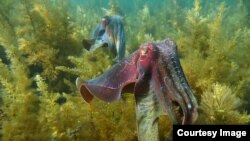Fish populations all over the world are challenged but cephalopods, those canny invertebrates that include squid, nautilus, octopus and cuttlefish, are proving as adaptable as they are smart.
A recent report from the United Nations estimated that over 70 percent of the worlds fish stocks are in their words either fully exploited meaning there is no room to expand the number we catch, or over-exploited, meaning we are overfishing and depleting the fish stocks.
Scientists at the University of Adelaide in Australia, however, have discovered that over the past 60 years, cephalopod numbers have risen across the entire expanse of our water systems.
Unpredictable news
That may be good news for those of you who really like calamari but is an unpredictable bit of news for the health of the world's oceans.
Zoe Doubleday is a research Fellow in the Environment Institute and School of Biological Sciences and the author of a new report appearing in Monday's Cell Press journal Current Biology.
She told VOA that cephalopods are unique in that they are both "voracious and adaptable predators," and "an important source of food for many marine species ((e.g. marine mammals, fish, seabirds)), and support many important commercial and subsistence fisheries around the world."
The discovery came, ironically when the team set out to study information that suggested the giant Australian cuttlefish was disappearing.
"Surprisingly," she says, "analyses revealed that cephalopods, as a whole, are in fact increasing; and since this study, cuttlefish numbers from this iconic population near Whyalla are luckily bouncing back."
Double threat
Doubleday says being good eaters and being good food means it is important to conduct more research because these creatures have such a broad impact in the world's oceans.
"... increases in cephalopod abundance" Doubleday told VOA "have implications for both the marine food web and us."
She also said they are important food sources for predatory fish, sharks and even seabirds and that means more food for them.
They are also predators, however, and more of them means they may put more pressure on ocean species that are already having trouble adapting to climate change, or are being overfished.
"We're currently investigating what may be causing them to proliferate - global warming and overfishing of fish species are two theories," said Doubleday. "It is a difficult, but important question to answer, as it may tell us an even bigger story about how human activities are changing the ocean."





